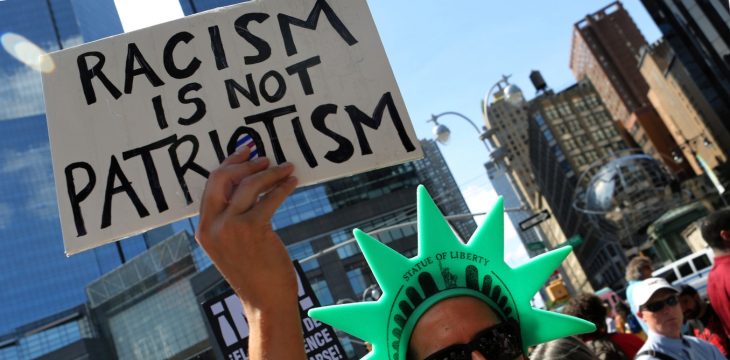The number and exuberance of white nationalists who descended on Charlottesville sent emotional tremors through the nation. Some worried that this was the beginning of an expanding movement that would hearken us back to darker times.
And many felt that President Donald Trump’s comments only made matters worse. The president’s implied moral equivalency between racist elements and counterprotesters emboldened the former: David Duke, a white nationalist leader and former KKK grand wizard, thanked the president for his “honesty” and willingness to “condemn the leftist terrorists.”
As a civil rights scholar, however, this naked display of racism does not dampen my expectations for racial justice. We have been here before.
In the 1960s, Martin Luther King Jr. marched with thousands of people for African-American voting rights and was met by violent opposition. The hostility caused some to doubt whether justice was still at hand, but King believed it was a setback that would be overcome. Quoting the wisdom of a 19th-century Unitarian minister, King famously said, “The arc of the moral universe is long, but it bends toward justice.”
The public outcry over Charlottesville, along with my own reading of the long history of civil rights, only confirms King’s truth. For better or worse, Charlottesville is part of our nation’s long moral reckoning – one that reveals we’re still bending toward justice.
Reconstruction
Our greatest racial reckoning began in the Civil War, but it didn’t end there. The three decades that followed the war were, in their own ways, just as radical.
Between 1863 and 1877, the United States literally, politically and ideologically rebuilt itself. In the immediate aftermath of the war, our nation amended its constitution three times: abolishing slavery, granting African-Americans citizenship and guaranteeing equality, fairness and voting rights for all. In 1867, Congress passed the Reconstruction Acts, which required southern states to rewrite their state constitutions in order to be part of the new conceptualized Union.
Southern states conceded, ushering in changes that would have been unimaginable just a few years earlier. In South Carolina, for instance, African-Americans were actually a majority of the delegates at the state’s 1868 constitutional convention. And in 1870, Jonathan Jasper Wright became the first African-American to serve as a state supreme court justice.
South Carolina was no outlier. African-American political participation across the South increased dramatically, leading to progressive public policies in education, voting and civil rights. Within just a few short years, more African-Americans served in Congress than at any other period for the next hundred years.
Redemption
Despite the incredible progress that was made, Reconstruction’s changes were understandably fragile, maintained only by the presence of Union soldiers. When they left the South in 1877, a new era began: what southerners called “Redemption.”
Through violence, corruption and legal manipulation, southern whites would disenfranchise African-Americans and regain political control. They would then pass an ever-expanding list of Jim Crow laws designed to limit other basic rights. While no longer slaves, African-Americans were, in effect, reduced to second-class citizens.
Yet, Redemption could not entirely rewind the nation to a pre-Civil War state. African-Americans continued to serve as elected officials (though in smaller numbers) and made steady gains in education, business and property.
Obama, Trump and Charlottesville
Fast forward a century. The Civil Rights movement has achieved numerous successes and the nation has elected its first black president – not once, but twice.
For the optimistic (or perhaps naive), this moment symbolized an end to the long struggle for equality, rather than a landmark in then nation’s ongoing arc toward justice.
For white nationalists, however, the Barack Obama presidency was its own modern Reconstruction and, thus, the election of Trump the beginning of another Redemption.
Any number of data points might confirm white nationalist hopes (and others’ fears): Steve Bannon in the president’s inner circle; Attorney General Sessions’ intent to crack down on drugs and discrimination against whites; and a Republican Party that just cannot quit its president, no matter how far right he tacks on social issues. Of course, these new events come on top of preexisting racial inequalities in nearly every aspect of life.
But I believe the defining moments in our moral arc are the swift, sharp rebukes of this “redemption.” Within a week of the violence in Charlottesville, politicans, business leadersand individuals of all political stripes made it clear that racist ideology and its overt manifestations are no longer acceptable. Equally important, people of good will have taken to the streets to show that they will not quietly abide intimidating and hurtful rhetoric.
White supremacists have seemingly sparked what not even Martin Luther King Jr. could: a supermajority insisting that America will not abandon equality and inclusiveness.
What the future holds
Jim Crow laws dominated everyday life for a century following Reconstruction. That so-called Redemption was so deep-rooted that it took a multi-decade civil rights movement just to eliminate explicit discrimination in the law books. Many of the practical, sociological and psychological effects of slavery and racism, however, are still with us today.
Sadly, there are those who believe we still need a modern Redemption: White supremacists and neo-Nazis came out in force to defend a Confederate statue. Yet, the lesson to take from Charlottesville is not that those ideas persist, but that they are being sharply and quickly rebuked by a moral majority. Unlike times of the past, there is no mainstream constituency willing to overtly defend racism. And so, unlike the years after the Civil War, no actual redemption period will begin, much less live a long life.
Charlottesville also reveals that our moral arc is not unbending. It will flex uncomfortably at times, but it continues to move toward justice.
This is no guarantee of what will happen tomorrow. As King made clear, progress requires that people of good faith struggle against inequality. Our nation’s growing distaste for racism should not be mistaken for the actual will to fight for equality. In many ways, complacency is what made Charlottesville possible in the first place.
The United States is a better place today than it was a hundred years ago, and it can be even better in the years to come. But I believe we can achieve that only if we maintain an open dialogue and stand up for the equality that still proves elusive for so many Americans.
This article was first published by TheConversation






